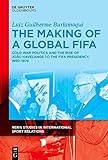The Making of a Global FIFA : Cold War Politics and the Rise of João Havelange to the FIFA Presidency, 1950–1974 / Luiz Burlamaqui.
Material type: TextSeries: RERIS Studies in International Sport Relations ; 1Publisher: München ; Wien : De Gruyter Oldenbourg, [2023]Description: 1 online resource (XIII, 243 p.)Content type:
TextSeries: RERIS Studies in International Sport Relations ; 1Publisher: München ; Wien : De Gruyter Oldenbourg, [2023]Description: 1 online resource (XIII, 243 p.)Content type: - 9783110759686
- 9783110760040
- 9783110759907
- 796.3346609045
- online - DeGruyter
- Issued also in print.
| Item type | Current library | Call number | URL | Status | Notes | Barcode | |
|---|---|---|---|---|---|---|---|
 eBook
eBook
|
Biblioteca "Angelicum" Pont. Univ. S.Tommaso d'Aquino Nuvola online | online - DeGruyter (Browse shelf(Opens below)) | Online access | Not for loan (Accesso limitato) | Accesso per gli utenti autorizzati / Access for authorized users | (dgr)9783110759907 |
Frontmatter -- Acknowledgements -- Contents -- List of abbreviations -- Foreword by Barbara J. Keys -- Introduction -- Chapter 1 English stiffness: a political history of FIFA during the long sixties, 1959–1971 -- Chapter 2 The administrator: politics and ideology in the making of a social legacy (1916–1970) -- Chapter 3 “A Blonde Pelé”: business organization, political propaganda, and the 1970 World Cup -- Chapter 4 At the heart of the Brazilian miracle: casing and political propaganda in Havelange’s election as the president of FIFA (1971–1974) -- Chapter 5 The world that we had lost. FIFA political crisis and the making of a new international football order, 1971–1974 -- Conclusion: a new international football order? -- Annex: honors received by Havelange between August 1970 and July 1974 -- Bibliography -- Index
restricted access online access with authorization star
http://purl.org/coar/access_right/c_16ec
In 1974, the Brazilian sports official João Havelange was elected FIFA’s president in a two-round election, defeating the incumbent Stanley Rous. The story told by Havelange himself describes a private odyssey in which the protagonist crisscrosses two thirds of the world canvassing for votes and challenging the institutional status quo. For many scholars, Havelange’s triumph changed FIFA’s (International Federation of Football Association) identity, gradually turning it into a global and immensely wealthy institution. Conversely, the election can be analyzed as a historical event. It can be thought of as a political window by means of which the international dynamic of a specific moment in the Cold War can be perceived. In this regard, this book seeks to understand which actors were involved in the election, how the networks were shaped, and which political agents were directly engaged in the campaign.
Issued also in print.
Mode of access: Internet via World Wide Web.
In English.
Description based on online resource; title from PDF title page (publisher's Web site, viewed 06. Mrz 2024)


